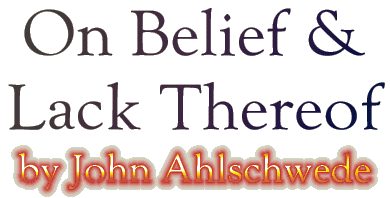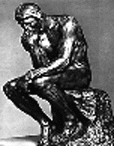

So, if I were to believe that toasters can fly and you were to disbelieve my idea, that would entail your believing that it is false that toasters fly or, as we would say more commonly, you would believe that toasters do not fly. So disbelief in a statement is a belief in the denial of that statement.
The alternative to taking either of these positions is to instead claim ignorance about the flights of toasters. You can maintain that it is beyond your capabilities to discern whether or not toasters fly. You can further eradicate all opinions of toasters from your mind. This being the case, if you see that your toaster is about to fall off of the table, you could not decide if you should try to catch it or not, because it may or may not resent your hindering of its flight.
To say, on the other hand, that I believe toasters do not fly is to state a belief and should not be taken as anything more than that. By making this statement, I do not have, nor am I claiming to have, an exhaustive knowledge of toasters. Perhaps it could be that there is a flying toaster somewhere--don’t ask me how such a thing could be. If indeed one would exist, would I be irrational for my belief that toasters do not fly?
There is at least one thing that we could say--that I would be wrong. Sometimes there are other consequences of holding a false belief, sometimes not. But, when faced with problems (such as a toaster falling) my belief does give me an advantage over the person who claims ignorance because they cannot be sure one way or the other. I know how to react. I believe that the toaster will hit the floor and perhaps break and, because of that, I will endeavor to stop it. It's better to make one's best guess about what to do, then to take no action whatsoever. The only way to find out if my belief is rational or not is to stop and look at what I based my belief on.
What can we base belief on? Let’s look at the strong skeptic and see what he bases belief on. The skeptic is a person that holds some level of doubt about knowledge. The strong skeptic, then, would be one that believes that humans can know nothing. The strong skeptic would probably believe that the closest things to knowledge we have are estimates, guesses, inference and probability judgments and surely, then, these are what he bases his belief on.
If a skeptic looks at my statement about his inability to decide
whether to catch a falling toaster or not, he may think it unfair.
He might say that I have reason to believe the toaster will fall rather
than fly, even if I don’t have knowledge that it will. These are
the estimates, guesses, inference, and probability judgments I was referring
to. But if (along with claims of knowledge) you eradicate all beliefs
from your mind, then you have nothing left to work with.
 |
| “What’s all this crap about toasters?" |
Any statement which one believes is a belief. If one senses that his bladder is full, he will come to the belief that “I ought to go pee.” If there was an absolute skeptic who (beyond claiming no knowledge) held no beliefs, he, by definition, would not accept this belief of his impending urination. He would be relegated to a level lower than animals when he let himself sit until he couldn’t hold it in any longer and the only reaction he could have to his sudden (fully unexpected) urination would be his instinctual, involuntary reactions. He couldn’t even acknowledge that he then ought to change his pants. Without knowledge or opinion our minds only hold instinct, which isn’t much. Needless to say I’m skeptical if such an absolute skeptic exists who isn’t brain dead. Being a skeptic, however, does not necessitate eradicating all beliefs from one's mind. It only entails the denial of knowledge.
These things--guesses, estimates, inference, and probability--are what we all base belief off of. So looking at the toasters and given my past experience with them, I could infer that this toaster that appears to be about to fall to the ground probably will fall to the ground.
Chances are that a person might want to hold a position between my view of the absolute skeptic and my own position. He will wonder why it is that he cannot have knowledge without opinion. First of all, knowledge is opinion. Only it is justified, correct opinion. The only difference between what one probably thinks is knowledge (if he thinks it exists) and what he relegates as belief is the amount of evidence. But I want to point out that there is no clear line between what is and what is not a sufficient amount of evidence. There are merely opinions about what part of this wide spectrum of belief are fit the eternal reverence of the title “Fact” and which are not.
There are some things that a person can afford to not take a stance on. When I see the toaster about to fall, I can be purely noncommittal as to whether the toaster will break or not if and when it strikes the ground. But on issues that really matter and are of a great importance to humanity--if they are of such importance--it is usually necessary to come down on one side of the issue or the other, even if I only decide that one possibility appears slightly more probable than the other I will still end up taking a belief. For unless the evidence for a statement is indeed truly sketchy at best, it will in some cases be better to act on a best guess than to not act at all.
The skeptic might think I am making too much of a blanket statement when I say that I believe that toasters do not fly. Perhaps I could cut that back to only saying that the toasters of which I have intimate knowledge cannot fly and admit that there might really be a flying toaster out there in this wonderful land of opportunity we live in. Perhaps I could tell Mrs. Jones that no, I don’t believe that her toaster flies. And perhaps I could tell a G.E. spokesman that no, I don’t believe that G.E. sells any flying toasters. And perhaps I could walk down to Sears and tell Will the appliance guy that I don’t think any of the toasters they have at Sears fly. Perhaps the skeptic would be a bit happier if I would make these statements but not the entire blanket statement that I believe that there are no flying toasters.
But what if there were a mad cult of the flying toaster that held that toasters indeed could fly and only needed the proper encouragement? And let us say that I have examined their logic and it seems to be the most childish drivel I have ever seen in my life. What if this gang of ruffians had begun to go about seizing people’s toasters and throwing them off of tall buildings and the national economy was suffering terribly because of it? When someone asked me in this charged atmosphere about my view on flying toasters should I say that I don’t know if toasters fly or not?
Should I say, well, I think that the exact method by which this gang is going about it all is quite wrong, but I wouldn’t really rule out the possibility that there was a flying toaster. Wouldn’t that kind of attitude lead this gang of ne’er-do-wells to think that they weren’t utterly ridiculous? If I’ve weighed the possibilities in my head and have decided that it is incredibly unlikely that a toaster flies, shouldn’t I--even if I don’t have "proof" of all toasters’ land-based nature--loudly proclaim that no, there are no toasters that fly and that all those ruffians should leave the toasters alone? Just what sort of impact would I make if I stood up and loudly proclaimed that it really was just impossible to call one way or the other? If I think it is highly probable that toasters don’t fly, why don’t I just say “toasters do not fly”? For judging something highly probable should lead us to a belief in it (if, that is, "judging something highly probably" and believing in something can even be said to be different things in the first place.)
One might ask what happened to deduction and why it is that we
cannot base our beliefs off of it. Well, we can indeed base our beliefs
off of deduction, but I want to make a point clear. To some extent
all deduction is based on inference and probability judgments. Take
a classic case of deduction: a chemist performing an experiment.
Dr. Puggle discovered quite by accident that if you combine the mysterious
Compound X with bourbon it results in a bizarre reaction. Dr. Puggle
is interested in finding out if this reaction involved just one of the
elements that make up Compound X, so he performs an experiment in which
he separately combines each of its components with bourbon. He finds
that the reaction is the result of bourbon’s reaction to Einsteinium.
 |
| The elusive alcoholic chemist, Dr. Puggle. |
The pure skeptic will claim that we still have no knowledge that Einsteinium and bourbon produce this odd reaction. It could be, for example, that Dr. Puggle’s Einsteinium squeeze bottle was contaminated with some other material. Even if we test it now for a contaminant, the contaminated portion could have been used up in our experiment. When scientists talk about fact, they mean a thing which it would be irrational to withhold assent from--that’s the beautiful thing about science, it’s always examining its own conclusions. So, when we reach our conclusion that bourbon and Einsteinium react in a psychotic manner, it is only by virtue of an inference that based on our observations that Dr. Puggle’s scientific squeeze bottles have always been sterile in the past, his Einsteinium squeeze bottle was sterile in this instance. We judge his conclusions highly probable. And thus even what we find to be true by deduction is subject to inferential checks.
Beliefs should be based on probability. To withhold belief
is to limit the actions one can take. As Socrates knew, it’s much
easier to attack the beliefs of others than to defend beliefs of one’s
own, but it may be more foolish not to hold any beliefs at all than to
hold imperfect ones.
 |
 |
|
|
|
The authors of these works are sincerely seeking comments and criticisms, please send them here.
The works on these pages are the intellectual property of their creators and are copyrighted by their creators. All rights reserved.
Feel free to e-mail us at: [email protected]